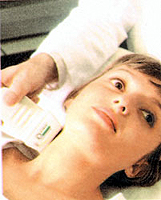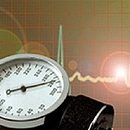According to statistics, hypothyroidism is one of the most common diseases of the endocrine system. Especially often hypothyroidism occurs in the regions distant from the sea. In the study of large groups of the population, it was found that every tenth woman over 65 has signs of the initial stage of this disease.
Content
What it is?
Hypothyroidism - a disease associated with insufficient provision of human organs and tissues hormones of thyroid gland. This usually happens when the thyroid gland does not produce the required amount of hormones.
What happens to?
The development of hypothyroidism can lead:
- Thyroid diseases (injuries, inflammatory processes, congenital anomalies) - transferred operations on the thyroid gland;
- Insufficient intake of iodine into the body with food;
- Multiple diseases (for example, hypocituitarism)
What's happening?
With a decrease in the number of thyroid hormones, the metabolism in the body is disturbed, the work of the cardiovascular system, the gastrointestinal tract, mental and sexual activity deteriorates.
Symptoms of hypothyroidism develop slowly, unnoticed, so patients do not turn to the doctor for a long time.
In case of illness, there are:
- lethargy, drowsiness;
- worsening memory, attention, mental activity;
- intolerance to cold and heat;
- dry skin, hair loss;
- swelling;
- weight gain;
- constipation;
- In women - a violation of menstruation, men - a decrease in potency and sexual attraction.
Than dangerous?
A severe, threatening life with a complication of hypothyroidism is a hypothyroid coma, developing in senior patients in the absence of treatment. At a coma, there is a loss of consciousness and the oppression of the work of all organism organs.
Hypothyroid Coma may be provoked by cooling, injury, acute infectious and other diseases.
Diagnostics
The diagnosis of hypothyroidism establishes an endocrinologist on the basis of complaints and appearance of patients, as well as research data:
 Blood test on thyroid hormones (thyroxine and triiodothyronine) and thyrotropic hormone: there is a reduced content of thyroid hormones in the blood, the level of thyrotropic hormone can be both elevated and lowered;
Blood test on thyroid hormones (thyroxine and triiodothyronine) and thyrotropic hormone: there is a reduced content of thyroid hormones in the blood, the level of thyrotropic hormone can be both elevated and lowered;
- Biochemical blood test: under hypothyroidism there is an increase in cholesterol and DR.;
- To determine the size and structure of the thyroid gland, the implementation of the ultrasound is shown;
- In some cases, it may be necessary to carry out the scintigraphy of the thyroid gland or puncture tone-game biopsy.
Treatment
The basis of treatment - the purpose of the hormones of the thyroid gland. Preparations are well transferred and convenient to use. As a rule, it is necessary to take the medicine once a day.
The endocrinologist sees the necessary dose of the drug, taking into account the severity and duration of the disease, the age of the patient and the state of his health. In most cases, treatment is carried out for life.
To monitor treatment, you need to visit the endocrinologist regularly (once a year) to check the level of thyroid hormones and thyrotropic hormone.
If the cause of the disease is to reduce iodine intake with food, then the patient prescribe iodine preparations (iodine asset and others.), recommend to use more maritime products.
Compliance with the recommendations of the doctor and the correct reception of drugs allows you to completely eliminate the symptoms of hypothyroidism. If the hypothyroidism is not treated, the patient's condition is gradually deteriorating.
Lack of treatment of hypothyroidism in children leads to a delay in growth, physical and mental development.
Prevention
The prevention of the hypothyroidism is a diverse nutrition, providing sufficient intake of iodine into the body, timely treatment of thyroid diseases.









